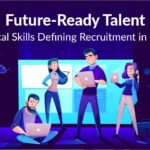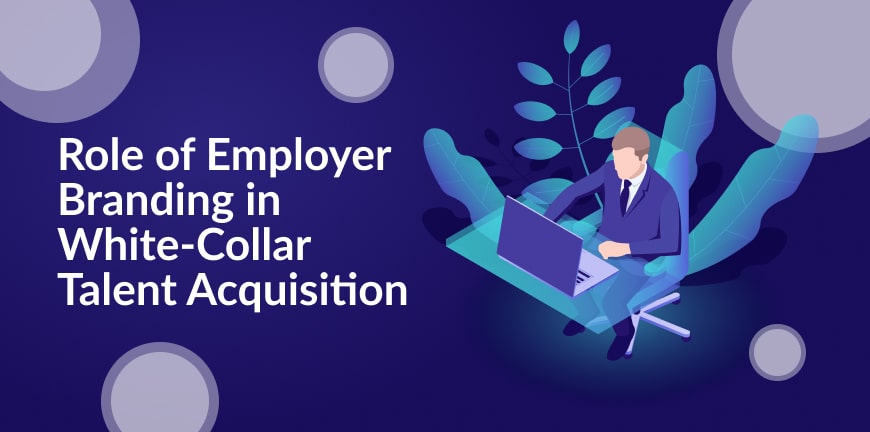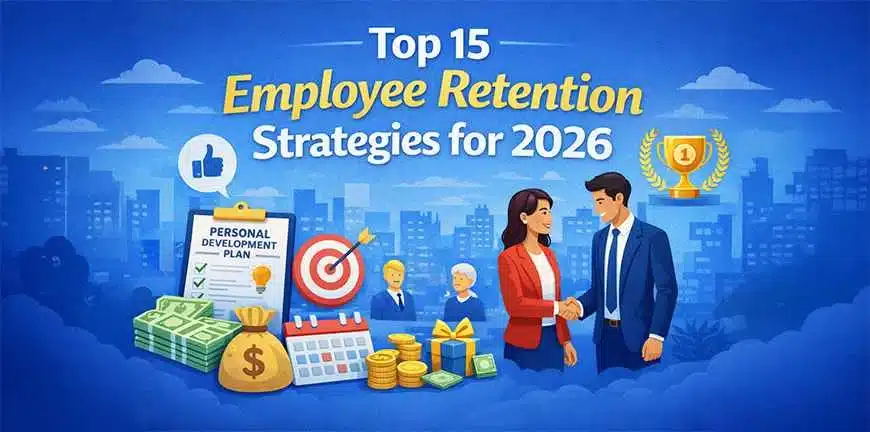
What Is Payroll Maintenance? Importance, Process, Benefits, Challenges, Best Practices
19/05/2025
Future-Ready Talent: Critical Skills Defining Recruitment in 2025
21/05/2025In today’s world, competition is fierce and white-collar job market has emerged as the battleground for instinctual minds. The rules and meaning of talent acquisition has evolved in sectors over time, whether its tech, finance, law, or consulting.
Top talents are seeking a bit more than mere cheques. They are evaluating your job boards and your brand. They are razer focused on discovering meaning, understanding culture, and experiencing flexibility and a sense of purpose.
In this new realm of recruitment, employer branding no longer remains an HR initiative it should be your prime strategy to attract astute individuals and overwhelm your competitors by recruiting A listers.
Global Trends and Priorities
- Diversity and Inclusion: 78% of companies prioritize diversity to enhance their employer brand.
- Candidate Expectations: 76% of candidates desire insights into company culture and values.
- Gen Z Preferences: 75% of Generation Z individuals seek long-term employment with supportive employers.
Employer Branding Core
Employer branding is a concept where organizations demonstrate their ethics, culture, mission, and work environment to the world, which entails not only their existing employees but also candidates, industry associates, and a larger spectrum of people.
An organization needs to think from the perspective of an employer, not just a business. They must display and craft exemplary and compelling stories to appeal to individuals who would visit their career page for the first time.
The narrative is portrayed through reviews by current employees, the tone of LinkedIn posts, and the myriad experiences they have shared with their industry peers, which are worthwhile.
Employer Branding in White-Collar Hiring
1. Highly Skilled Candidates
White-collar professionals who have expertise in areas like technology, finance, engineering, or strategy are always in high demand, but they also rule. They have a plethora of opportunities laid and can choose any job with a fat pay cheque, however their decision making does not depend on the salary alone.
Today’s finest skilled professionals desire something profound, preferably a workplace where there is professional and personal growth and they can be a part of a work environment where they are valued and acknowledged.
That is where a robust employer brand does the magic by providing a clear and authentic picture talking about their vision objectives, values, and people.
The story must strike an emotional chord with the candidates where they feel that they belong there giving them a direction and purpose to contribute to the development of the company. Employer branding is the cornerstone of shaping decisions of highly qualified candidates to select an organisation over their competitor.
2. Decision-Making Cycles
White collar professionals and job seekers are keener on doing in-depth research to make serious career decisions, especially individuals in senior and mid senior roles. Unlike blue-collar or entry-level job seekers, these white-collar professionals while leaving the current role will contemplate the financial and reputational risk.
They will also be thinking in terms of long-term engagements and how their growth trajectory will be enhanced aligning with professional and personal values.
White-collar professionals prioritize a company’s organizational structure, the culture, value system, leadership prerogatives and internal development processes. They usually evaluate organizations to see whether they are in alignment with their goals and values, so they explore various methods to gain extensive knowledge about the company they are looking to be a part of.
They analyse employee reviews to get an understanding of the workplace conditions., they will investigate a company’s LinkedIn page and find out about their level of professionalism and credibility.
Candidates also explore authentic videos or blog-based testimonials for a human connection, and they also value ethical practices like DEI (diversity, equity, inclusion) efforts, and awards or recognition.
3. Culture Alignment
For white collar professionals who are seeking leadership and high-profile roles are inclined towards environments that will drive them to thrive while supporting their identity and aspirations. They believe in hard core collaboration as their work mostly revolves around working with cross-functional teamwork, communication, and smooth coordination.
White-collar professionals yearn autonomy and intellectual spur. They want to see how structured teams are and if there are mentorship and peer support systems in place.
They prefer organizations that initiates and encourages innovative programs and processes for the growth and development of employees. They also value the scope of creative liberty in teams where they can voice their opinions and make compelling suggestions.
A Committing culture fit for them is not fun and benefits, it means a sense of purpose with sharing of values, ethics, communication patterns and goals. Intellectually they expect a space where they are challenged by their peers in terms of their expertise where they are respected.
What are the Key Elements of Employer Branding?
1. Clarity in Mission and Values
The clear articulation what a company’s goals are is intrinsic when it comes to attracting likeminded white-collar professionals, as they care about finding a purpose. The specific areas of a brand should be highlighted. It could be expertise around sustainability, innovation, social impact, or industry leadership.
2. Visible Employee Experience
A company sharing stories that come out of the horse’s mouth like their own teams through social media platforms or blogs and videos posted on websites showcase the daily work life. This is a strategy that humanizes a brand building faith and enables to draw potential hires.
3. Mobile Optimization
A forward-thinking brand is one which knows how to leverage mobile devices to make it easier for job seeking professionals to search and apply. It could be job postings, application forms, career pages with job descriptions that directly resonates with the company culture and objectives.
4. Robust Digital Presence
A strong digital presence is the backbone of a company in today’s day and age where social media, careers page, LinkedIn profile, and employer review sites form an integral part of the digital character. A strong impression is made with compelling visual representations, consistent communication, and easy navigation.
Employer Branding Supporting Recruitment Outcomes
- Enhances Application Volume and Quality
- Reduces Cost-Per-Hire
- Increases Time-to-Hire.
- Boosts Employee Engagement
Impact of Employer Branding on White-Collar Talent Acquisition Metrics
| Metric | Impact |
| Candidate Application | Rate 88% consider employer brand before applying |
| Quality of Hire | 3x more likely with employer branding investment |
| Turnover Rate | 28% reduction with strong employer brand |
| Cost Per Hire | Up to 50% decrease |
| Time to Hire | Reduced by up to 50% |
| Employee Engagement | Increased by up to 20% |
| Referral Rates | Increased by 51% |
Search for a white-collar professional should not end up as a goose chase for companies. In the competition for engaging a white-collar talent, an employer brand must be instrumental in generating an impact that is of a magnitude which hits aim elite professional so hard that they have no choice left but to select the brand.
Top tier professionals crave for purpose, culture, and alignment. A sturdy, authentic employer brand aims to win trust and not just attention. Companies investing in brand enhancement strategies will fill roles and create a powerhouse of talent fostering long term triumph.

Rajkumar Shanmugam
Rajkumar Shanmugam is the Head of HR at ALP Consulting, bringing over 19 years of comprehensive HR leadership experience across India and international markets. His expertise spans talent acquisition, employee relations, performance management, compliance, and HR transformation. Rajkumar has a proven track record of driving people-centric initiatives, enhancing workplace culture, and aligning HR strategy with business goals. With extensive experience in US staffing operations and global mobility, he continues to lead organizational excellence through innovation and employee engagement.




